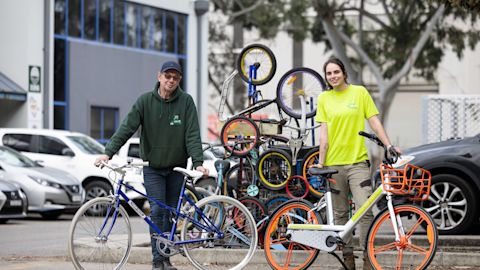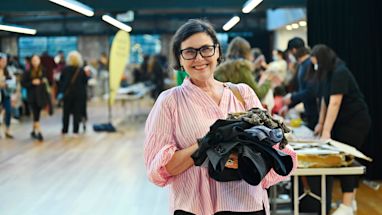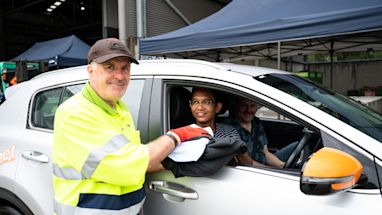We’ve partnered with Revolve ReCYCLING to accept old bikes and scooters at our Recycle It Saturday events. The next event is Saturday 23 August, 9am to 3pm, at Alexandra Canal Depot.
Environmentalism has been the constant thread in Guido Verbist’s life.
The Revolve ReCYCLING guru has done everything from developing tiny house
programs to creating risk protocols for Greenpeace workers in the Amazon and Iraq.
Now his attention is on bikes – and where they go when we don’t want them anymore.

“We know that in the Sydney metropolitan area, right now, there are more than 10,000 bikes sitting in basements that people do not need any more, which could be given a new life immediately. If you take that out to the next 12 months, there are more than 150,000," Verbist said.
“If no one takes action, many, even most, of these will end up in landfill.”
Recycling bikes makes financial and environmental sense
Rehoming bikes is nothing new, but most operations rely on volunteer labour or donations. Revolve ReCYCLING is showing that diverting old bikes from landfill is not only environmentally beneficial, but also economically sustainable.
The key lies in unlocking the value of the materials used in the bikes, not just refurbishing the bikes for resale.

“Even if a bike can’t be re-homed immediately, there is value in the steel, the aluminium, the rubber – nearly all of the bike can be recycled,” Verbist said.
“We don’t say no to any bike, we take them all.”
Bikes too far gone to be refurbished are stripped down and useful parts are removed to repair other bikes. Kids' bicycles are repaired and distributed to families in need.
“Once we have the bikes, we triage them with our bike mechanics. Roughly 20% of the bikes that are donated, we consider good enough to redeploy, to be sold.”

Bike riding has increased in recent years and the second-hand market is strong.
“This has also been backed by an increase in bike lanes and bike infrastructure, so more people are feeling confident to ride,” Verbist said.
“We don’t try to get the maximum amount of money for each bike. It’s more important to move the bikes on than to sit on one and get every single dollar out of it.”
Scaling up and creating jobs
The next step is scaling up the operation.
“We want to get to 6,000 bikes a year,” Verbist said.
This increase in scale brings employment opportunities.
“Disassembling the bikes for recycling is not necessarily highly-skilled work, and we want to explore what employment opportunities might be possible, particularly for people with disability."
Drop off your old bike at Recycle It Saturday

We’ve partnered with Revolve ReCYCLING to accept old bikes and scooters at our Recycle It Saturday events. The next event is Saturday 23 August, 9am to 3pm, at Alexandra Canal Depot.
For those who can’t make it to Recycle It Saturday, check out Revolve ReCYCLING’s other drop-off location. You can also book a collection for a small fee.
Giving your old bike a second life is a simple yet powerful way to help the environment. Whether it’s rehomed or recycled, every bike saved from landfill makes a difference.
Published 17 December 2021, updated 30 July 2025



